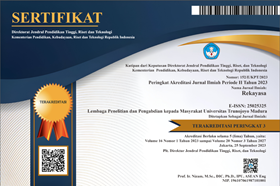Optimasi Manajemen Rapat di Masa Pandemi Covid-19 Berbasis SeMaR
Abstract
The meeting activity is one of the routine and scheduled activities that is definitely carried out in every institution, as well as the ITN Malang campus. Problems arise when Covid-19 begins to plague in the city of Malang so that teaching and learning activities on campus must be closed and demanded to work from home according to government recommendations. Difficulties that arise are the way to send invitations and record the results of meetings that have not been efficient. So, it is necessary to develop an application that functions to manage meetings in the ITN Malang internal environment named SeMaR (Meeting Management System). This application was developed based on web and Android using design sprint development method. The results of the analysis and testing show that the design of applications that involve potential users can produce an application that is truly in accordance with user requirements. In addition, the use of the SeMaR application to manage meeting activities in the ITN Malang is able to optimize employee performance especially during the Covid-19 pandemic, and meeting management can be more effective and efficient.
Keywords
Full Text:
PDF (Bahasa Indonesia)References
Celeste, L.P., Komlodi, A., & Lutters, W.G. (2015). Interruptive Notifications in Support of Task Management. Int. J. Human-Computer Studies, 79, 20-34.
Faried, M.Z., Mulwinda, A., & Primadiyono, Y. (2017). Pengembangan Aplikasi Android Bimbingan Skripsi dengan Fitur Notifikasi. Jurnal Teknik Elektro Unnes, 9(2), 74-79.
Mungkasa. (2020). Bekerja dari Rumah (Working From Home / WFH): Menuju Tatanan Baru Era Pandemi COVID 19. The Indonesian Journal of Development Planning, 4(2), 126-150.
Prasetyo, A., Az-Zhara, H. M., & Brata, H.A.
(2019). Perancangan Aplikasi Bimbingan Skripsi Berbasis Mobile dengan menggunakan Pendekatan Design Sprint. Jurnal Pengembangan Teknologi Informasi dan Ilmu Komputer, 3(6), 5808-5816.
Ramadhan, T., & Utomo, V.G. (2014). Rancang Bangun Aplikasi Mobile Untuk Notifikasi Jadwal Kuliah Berbasis Android (Studi Kasus: STMIK Provisi Semarang). Jurnal Teknologi Informasi dan Komunikasi, 5(2), 47-55.
Rokhmawati, R. I., Az-Zhara, H. M., & Ramadhana, R. (2019). Perancangan User Interface Aplikasi EzyPay menggunakan Metode Design Sprint. Jurnal Pengembangan Teknologi Informasi dan Ilmu Komputer, 3(9), 8831-8840.
Subagaya, K. A., Pratami, D., & Hasibuan, M. A. (2019). Pengembangan konten E-Learning Menggunakan Design Sprint Pada Mata Kuliah Manajemen Proyek. Jurnal Integrasi Sistem Industri, 6(2), 107-106.
Sumual, H., Batmetan, J. R., & Kambey, M. (2019). Design Sprint Methods for Developing Mobile Learning Application. 3rd UNJ International Conference on Technical and Vocational Education and Training 2018. KnE Social Science. 394–407.
Wirautama, I.K.D., Setiwan, B., & Wibowo, R.P. (2012). Pengembangan Aplikasi Pengelolaan Rapat Studi Kasus: Jurusan Sistem Informasi Institut Teknologi Sepuluh Nopember. Jurnal Politeknik POMITS, 1-4.
Yan, Z. (2015). Encyclopedia of Mobile Phone Behavior [Online] Available: https://books.google.co.id/books?id=bIkfCgAAQBAJ&printsec=frontc
over&hl=id#v=onepage&q&f=false
DOI
https://doi.org/10.21107/rekayasa.v13i3.9011Metrics
Refbacks
- There are currently no refbacks.
Copyright (c) 2020 Ahmad Faisol

This work is licensed under a Creative Commons Attribution-ShareAlike 4.0 International License.
























